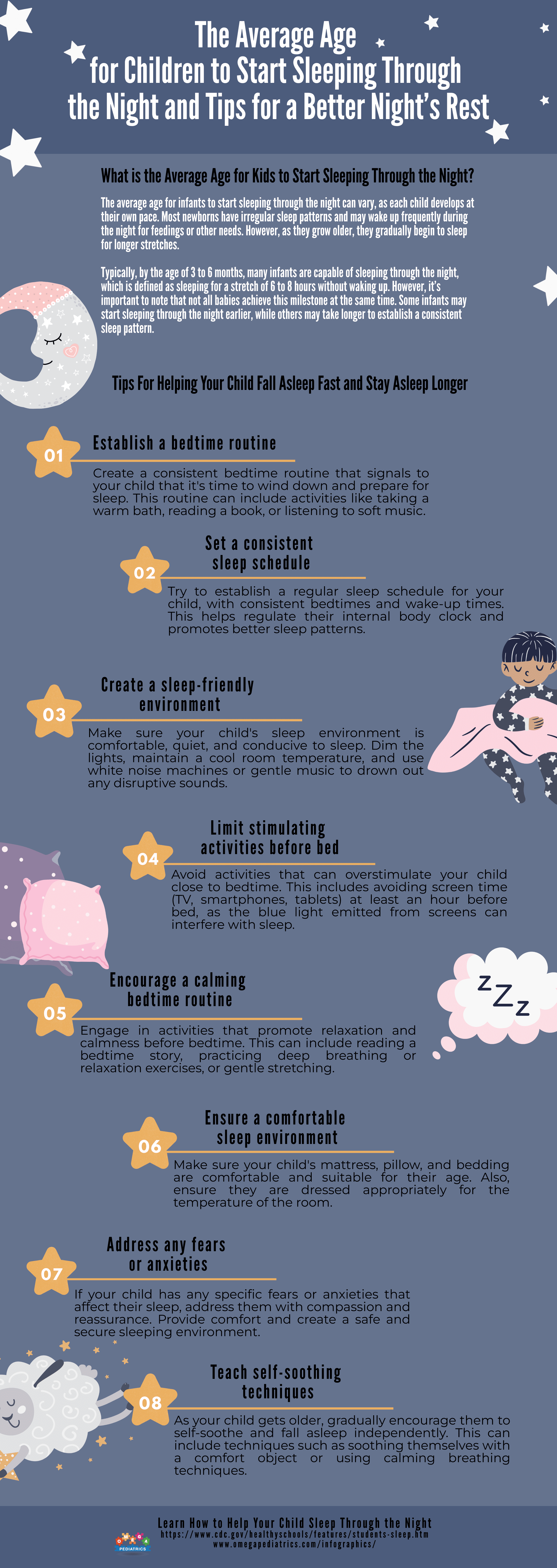Table of Contents

What is the Average Age for Kids to Start Sleeping Through the Night?
The average age for infants to start sleeping through the night can vary, as each child develops at their own pace. Most newborns have irregular sleep patterns and may wake up frequently during the night for feedings or other needs. However, as they grow older, they gradually begin to sleep for longer stretches.
Typically, by the age of 3 to 6 months, many infants are capable of sleeping through the night, which is defined as sleeping for a stretch of 6 to 8 hours without waking up. However, it’s important to note that not all babies achieve this milestone at the same time. Some infants may start sleeping through the night earlier, while others may take longer to establish a consistent sleep pattern.
Tips For Helping Your Child Fall Asleep Fast and Stay Asleep Longer
- Establish a bedtime routine
- Create a consistent bedtime routine that signals to your child that it’s time to wind down and prepare for sleep. This routine can include activities like taking a warm bath, reading a book, or listening to soft music.
- Set a consistent sleep schedule
- Try to establish a regular sleep schedule for your child, with consistent bedtimes and wake-up times. This helps regulate their internal body clock and promotes better sleep patterns.
- Create a sleep-friendly environment
- Make sure your child’s sleep environment is comfortable, quiet, and conducive to sleep. Dim the lights, maintain a cool room temperature, and use white noise machines or gentle music to drown out any disruptive sounds.
- Limit stimulating activities before bed
- Avoid activities that can overstimulate your child close to bedtime. This includes avoiding screen time (TV, smartphones, tablets) at least an hour before bed, as the blue light emitted from screens can interfere with sleep.
- Encourage a calming bedtime routine
- Engage in activities that promote relaxation and calmness before bedtime. This can include reading a bedtime story, practicing deep breathing or relaxation exercises, or gentle stretching.
- Ensure a comfortable sleep environment
- Make sure your child’s mattress, pillow, and bedding are comfortable and suitable for their age. Also, ensure they are dressed appropriately for the temperature of the room.
- Address any fears or anxieties
- If your child has any specific fears or anxieties that affect their sleep, address them with compassion and reassurance. Provide comfort and create a safe and secure sleeping environment.
- Teach self-soothing techniques
- As your child gets older, gradually encourage them to self-soothe and fall asleep independently. This can include techniques such as soothing themselves with a comfort object or using calming breathing techniques.
It’s important to note that while the tips mentioned above can be helpful in promoting better sleep for children, every child is unique, and what works for one child may not work for another. It’s essential to tailor your approach based on your child’s needs and preferences. Here are some additional informative points to consider:
Understanding Sleep Cycles
Sleep is a complex process that involves various stages and cycles. It’s important to understand that children, like adults, experience multiple sleep cycles throughout the night. Each cycle consists of non-REM (rapid eye movement) and REM sleep stages. Non-REM sleep is the deeper, more restorative phase, while REM sleep is associated with dreaming and cognitive development.
Night Waking
Night waking is common for infants and young children, even after they have started sleeping through the night. It’s important to remember that occasional night waking is normal and may be triggered by factors such as growth spurts, teething, developmental milestones, or temporary disruptions in routine. Responding to your child’s needs during these times with comfort and reassurance can help them settle back to sleep more easily.
Understanding Sleep Cycles
Sleep is a complex process that involves various stages and cycles. It’s important to understand that children, like adults, experience multiple sleep cycles throughout the night. Each cycle consists of non-REM (rapid eye movement) and REM sleep stages. Non-REM sleep is the deeper, more restorative phase, while REM sleep is associated with dreaming and cognitive development.
The sleep cycle is crucial for a child’s overall well-being as it plays a significant role in physical and cognitive development. Understanding these cycles can help parents appreciate the importance of allowing their children to complete full sleep cycles for optimal rest.
Night Waking
Night waking is common for infants and young children, even after they have started sleeping through the night. It’s important to remember that occasional night waking is normal and may be triggered by factors such as growth spurts, teething, developmental milestones, or temporary disruptions in routine. Responding to your child’s needs during these times with comfort and reassurance can help them settle back to sleep more easily.
Parents should approach night waking with patience and a gentle touch. Consistently addressing their child’s needs without creating disruptions or reinforcing nighttime activities can help establish healthy sleep patterns.
Gradual Transitions
Transitions in sleep patterns can be gradual. While some children may start sleeping through the night at a relatively early age, others may require more time and support. It’s important to be patient and flexible during this process. Celebrate small victories and progress, even if your child doesn’t achieve the milestone at the exact average age.
Understanding that children develop at their own pace is crucial. Factors such as temperament, individual differences, and environmental influences can contribute to the variations in sleep patterns. Parents should focus on creating a supportive sleep environment and providing the necessary tools for their child to develop healthy sleep habits over time.
Importance of Consistency
Consistency is key when it comes to establishing healthy sleep habits. Consistently following a bedtime routine, maintaining a regular sleep schedule, and creating a sleep-friendly environment help signal to your child’s body that it’s time to sleep. Over time, this consistency can help regulate their internal sleep-wake cycle and promote more restful sleep.
Parents should aim to create a stable and predictable sleep routine for their children. This can include consistent bedtime rituals, such as reading a book or singing a lullaby, to help signal to the child that it’s time to wind down and prepare for sleep. Consistency reinforces the association between these activities and sleep, making it easier for children to transition into a restful state.
Nurturing Healthy Sleep Habits
Encouraging healthy sleep habits from an early age can have long-lasting benefits. Besides the tips mentioned earlier, it’s important to promote a balanced lifestyle that includes regular physical activity, a nutritious diet, and an age-appropriate amount of sleep. Creating a calm and relaxing pre-sleep atmosphere can help your child unwind and prepare for sleep.
Parents can actively participate in fostering a sleep-friendly lifestyle for their children. This includes promoting a healthy and balanced diet, limiting caffeine intake, and ensuring that screen time, especially before bedtime, is controlled. These lifestyle factors contribute to a child’s overall well-being and support the development of healthy sleep habits.
Seeking Professional Guidance
If you have concerns about your child’s sleep patterns or if they consistently struggle with sleep despite implementing healthy sleep practices, it may be beneficial to consult a healthcare professional or a pediatric sleep specialist. They can provide personalized guidance, address any underlying issues, and offer strategies tailored to your child’s specific needs.
Professional guidance becomes crucial when persistent sleep challenges affect a child’s overall health and daily functioning. A healthcare professional can conduct a thorough assessment, taking into account any potential medical or psychological factors contributing to sleep difficulties. With the right support, parents can navigate these challenges and promote a positive sleep environment for their children.
Remember, healthy sleep habits are a journey that evolves as your child grows. By prioritizing sleep and implementing strategies that support restful nights, you can contribute to your child’s overall well-being, development, and happiness. Consistency, patience, and a holistic approach to sleep hygiene are key elements in nurturing a positive and enduring relationship between your child and sleep.
Gradual Transitions
Transitions in sleep patterns can be gradual. While some children may start sleeping through the night at a relatively early age, others may require more time and support. It’s important to be patient and flexible during this process. Celebrate small victories and progress, even if your child doesn’t achieve the milestone at the exact average age.
Importance of Consistency
Consistency is key when it comes to establishing healthy sleep habits. Consistently following a bedtime routine, maintaining a regular sleep schedule, and creating a sleep-friendly environment help signal to your child’s body that it’s time to sleep. Over time, this consistency can help regulate their internal sleep-wake cycle and promote more restful sleep.
Nurturing Healthy Sleep Habits
Encouraging healthy sleep habits from an early age can have long-lasting benefits. Besides the tips mentioned earlier, it’s important to promote a balanced lifestyle that includes regular physical activity, a nutritious diet, and an age-appropriate amount of sleep. Creating a calm and relaxing pre-sleep atmosphere can help your child unwind and prepare for sleep.
Seeking Professional Guidance
If you have concerns about your child’s sleep patterns or if they consistently struggle with sleep despite implementing healthy sleep practices, it may be beneficial to consult a healthcare professional or a pediatric sleep specialist. They can provide personalized guidance, address any underlying issues, and offer strategies tailored to your child’s specific needs.
Remember, healthy sleep habits are a journey that evolves as your child grows. By prioritizing sleep and implementing strategies that support restful nights, you can contribute to your child’s overall well-being, development, and happiness.
Conclusion
In conclusion, the journey of helping your child achieve restful nights is a dynamic process that involves understanding their unique needs, embracing flexibility, and fostering a supportive sleep environment. The average age for children to start sleeping through the night serves as a general guideline, but it’s essential to recognize and respect the individual differences in developmental timelines.
Understanding sleep cycles, acknowledging the normalcy of night waking, and recognizing the importance of gradual transitions are vital aspects of navigating the complexities of a child’s sleep patterns. Parents should approach these challenges with patience, compassion, and an understanding that each child’s sleep journey is distinct.
Consistency emerges as a cornerstone in establishing healthy sleep habits. A consistent bedtime routine, sleep schedule, and sleep-friendly environment contribute to signaling a child’s body that it’s time to rest. By reinforcing positive associations with sleep through these consistent practices, parents lay the foundation for a lifetime of good sleep hygiene.
Nurturing healthy sleep habits extends beyond nightly routines. Encouraging a balanced lifestyle that encompasses physical activity, a nutritious diet, and age-appropriate sleep durations contributes significantly to a child’s overall well-being. These holistic practices reinforce the interconnectedness of various aspects of a child’s life and underscore the importance of prioritizing sleep in the broader context of their health.
In instances where persistent sleep challenges arise, seeking professional guidance is a valuable step. Healthcare professionals and pediatric sleep specialists can provide targeted insights, address underlying issues, and offer personalized strategies to support both the child and the family.
As parents, recognizing that the pursuit of healthy sleep habits is an ongoing journey allows for adaptability and the celebration of small victories. Every child is unique, and their sleep needs may evolve over time. Celebrating progress, no matter how incremental, contributes to a positive and supportive atmosphere surrounding sleep.
In the end, prioritizing your child’s sleep is an investment in their overall well-being, development, and happiness. A well-rested child is better equipped to navigate the challenges of daily life, promote cognitive growth, and maintain optimal physical health. By fostering a positive relationship with sleep from an early age, parents contribute to a foundation that supports their child’s lifelong sleep habits.
FAQ
What’s the average age for children to start sleeping through the night?
Typically, infants begin sleeping for longer stretches between 3 to 6 months, with some starting earlier and others later. Every child’s development is unique.
How can parents help their child sleep better?
Establish a bedtime routine, maintain a consistent sleep schedule, create a comfortable sleep environment, limit stimulating activities before bed, and teach self-soothing techniques.
Why do children wake up at night even after starting to sleep through?
Night waking can be triggered by growth spurts, teething, developmental milestones, or disruptions in routine. Responding with comfort and reassurance helps them settle back to sleep.
Why is consistency important in sleep habits?
Consistent bedtime routines, sleep schedules, and environments signal to a child’s body that it’s time to sleep, promoting restful nights and regulating their internal sleep-wake cycle.
When should parents seek professional guidance for their child’s sleep?
If concerns persist despite healthy sleep practices, consulting a healthcare professional or pediatric sleep specialist can provide personalized insights and strategies tailored to the child’s needs.



